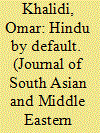| Srl | Item |
| 1 |
ID:
148846


|
|
|
|
|
| Summary/Abstract |
Neither Mr. Tilak nor his speeches really require any presentation or
foreword. His speeches are, like the featureless Brahman, self-luminous,
straightforward, lucid, never turning aside from the point which they
mean to hammer in or wrapping it up in ornamental verbiage, they read
like a series of self-evident propositions. And Mr. Tilak himself, his
career, his place in Indian politics are also a self-evident proposition, a
hard fact baffling and dismaying in the last degree to those to whom
his name has been anathema and his increasing pre-eminence figured
as a portent of evil.
|
|
|
|
|
|
|
|
|
|
|
|
|
|
|
|
| 2 |
ID:
100426


|
|
|
| 3 |
ID:
147200


|
|
|
|
|
| Summary/Abstract |
The first generation of radical nationalists in British India played a crucial role in the emergence of political propaganda as a fully fledged industry in the era after the partition of Bengal in 1905. Bal Gangadhar Tilak's 1897 trial is a key moment in this story: it marks the first time that dissent was criminalised, and that reading publics across British India were confronted with powerful arguments theorising political violence. This paper attempts to draw out the meanings Tilak made in two of his texts (an article and a poem, both published in Kesari) and the two most influential readings to which they were subject at the time: one in the courtroom, where the texts were successfully assimilated to the narrowest possible legal interpretation, resulting in Tilak's conviction, and the other in the Indian press, where the drama of the trial eclipsed the texts themselves. The trial moderated the militant message of the texts for the middle-class print public and allowed for a more acceptable definition of radicalism to emerge, one anchored in themes of suffering, sacrifice and victimisation.
|
|
|
|
|
|
|
|
|
|
|
|
|
|
|
|